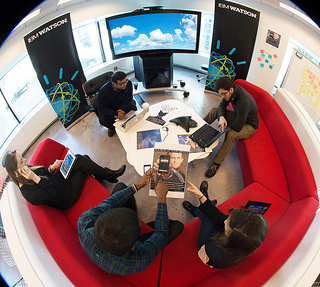There is no one role for AI or data science: this is a team effort

Where do data scientists come from? They don't all have PhDs, and hail from a wide variety of fields of study, levels of education, and prior jobs. That's the conclusion of Chris Lindner, a product scientist at Indeed, who recently looked at piles of resumes that his firm processes.

Only 20 percent of data scientists have PhDs, he finds -- and they come from a variety of backgrounds. "Many come from masters and PhD programs, in fields ranging from astrophysics to zoology," he finds. "Others come from the many new data science graduate programs that universities now offer. And still others came from other technology roles, such as software engineering or data analysis."
Many data science professionals also were software engineers in their previous jobs, Lindner observes. "Many transition to analyst roles, while others hop straight to data science."
His advice to employers: when seeking data science skills, keep your options open. "If you're looking for a generalist data scientist, don't throw out a resume just because the field or degree isn't what you expect. Data scientists are diverse in their education and background. Although most have an advanced degree in some field, there is no one field that dominates the job market. If you're having difficulty hiring experienced data scientists or scientists out of academia, consider bringing in individuals from software engineering or data analyst roles, as that is clearly a common pathway to data science."
Ultimately, the diversity required to move data science -- and consequently, artificial intelligence -- forward requires a multitude of skills. For AI and data science to be useful to a business, it needs to be a team sport.
IBM's Vijay Vijayasankar, for one, is a proponent of data-science-a-team approach. As he explained in a recent online talk with Diginomica's Jon Reed, the skills essential to AI and data science cannot be distilled into a single individual or role within the organization. This type of function "needs statistics experience; it needs science experience; it needs storytelling experience; it needs good visualization experience; it needs a lot of domain experience." he explained.
The problem employers are having is they are seeking exceptional individuals who are adept in many of these areas -- people that are hard to find, or are already recruited by some big glamorous web property. For mainstream enterprises, there needs to be a recognition that teams of professionals from a range of domains -- yes, that includes humanities -- can pool their expertise and deliver data-driven progress. "A lot of people who recruit data scientists often don't think about this team nature of this work and then get very frustrated later when it doesn't give them the type of benefit that that they want," Vijayasankar said.
"This isn't really about some rock star coming in and waving the magic data science wand," he continued.
Vijayasanka illustrated an example as seen at an aircraft parts manufacturer: They were spinning wheels on some data analytic problems, "and it wasn't until they sat down with engineers and the specialists and the managers with the data that that's when the light bulb started going off. It was sitting down with the domain experts that have been in the field for 20 years that they were able to immediately see the issue."
It's "not enough that you know the the machine learning aspect; you also need to know the process," he continued."How quote-to-cash works in in any ERP is not something that you can teach a data scientist in in two days. It is also tough to to teach in a machine learning to an ERP specialist in a couple of days or weeks. It's important that we cross-pollinate knowledge."